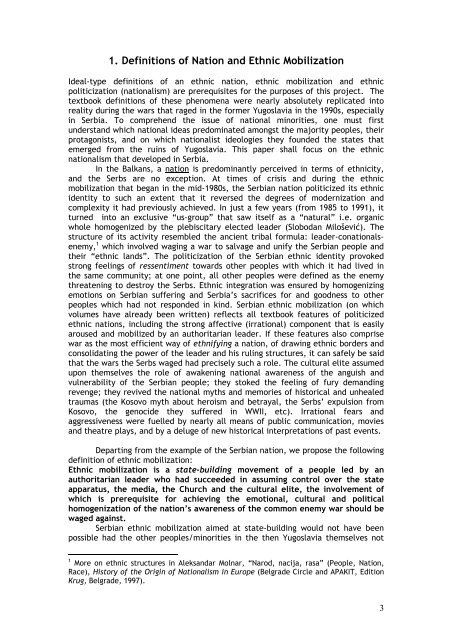Ethnic Mobilization in Serbia - EURAC
Ethnic Mobilization in Serbia - EURAC
Ethnic Mobilization in Serbia - EURAC
You also want an ePaper? Increase the reach of your titles
YUMPU automatically turns print PDFs into web optimized ePapers that Google loves.
1. Def<strong>in</strong>itions of Nation and <strong>Ethnic</strong> <strong>Mobilization</strong><br />
Ideal-type def<strong>in</strong>itions of an ethnic nation, ethnic mobilization and ethnic<br />
politicization (nationalism) are prerequisites for the purposes of this project. The<br />
textbook def<strong>in</strong>itions of these phenomena were nearly absolutely replicated <strong>in</strong>to<br />
reality dur<strong>in</strong>g the wars that raged <strong>in</strong> the former Yugoslavia <strong>in</strong> the 1990s, especially<br />
<strong>in</strong> <strong>Serbia</strong>. To comprehend the issue of national m<strong>in</strong>orities, one must first<br />
understand which national ideas predom<strong>in</strong>ated amongst the majority peoples, their<br />
protagonists, and on which nationalist ideologies they founded the states that<br />
emerged from the ru<strong>in</strong>s of Yugoslavia. This paper shall focus on the ethnic<br />
nationalism that developed <strong>in</strong> <strong>Serbia</strong>.<br />
In the Balkans, a nation is predom<strong>in</strong>antly perceived <strong>in</strong> terms of ethnicity,<br />
and the Serbs are no exception. At times of crisis and dur<strong>in</strong>g the ethnic<br />
mobilization that began <strong>in</strong> the mid-1980s, the <strong>Serbia</strong>n nation politicized its ethnic<br />
identity to such an extent that it reversed the degrees of modernization and<br />
complexity it had previously achieved. In just a few years (from 1985 to 1991), it<br />
turned <strong>in</strong>to an exclusive “us-group” that saw itself as a “natural” i.e. organic<br />
whole homogenized by the plebiscitary elected leader (Slobodan Milošević). The<br />
structure of its activity resembled the ancient tribal formula: leader-conationalsenemy,<br />
1 which <strong>in</strong>volved wag<strong>in</strong>g a war to salvage and unify the <strong>Serbia</strong>n people and<br />
their “ethnic lands”. The politicization of the <strong>Serbia</strong>n ethnic identity provoked<br />
strong feel<strong>in</strong>gs of ressentiment towards other peoples with which it had lived <strong>in</strong><br />
the same community; at one po<strong>in</strong>t, all other peoples were def<strong>in</strong>ed as the enemy<br />
threaten<strong>in</strong>g to destroy the Serbs. <strong>Ethnic</strong> <strong>in</strong>tegration was ensured by homogeniz<strong>in</strong>g<br />
emotions on <strong>Serbia</strong>n suffer<strong>in</strong>g and <strong>Serbia</strong>’s sacrifices for and goodness to other<br />
peoples which had not responded <strong>in</strong> k<strong>in</strong>d. <strong>Serbia</strong>n ethnic mobilization (on which<br />
volumes have already been written) reflects all textbook features of politicized<br />
ethnic nations, <strong>in</strong>clud<strong>in</strong>g the strong affective (irrational) component that is easily<br />
aroused and mobilized by an authoritarian leader. If these features also comprise<br />
war as the most efficient way of ethnify<strong>in</strong>g a nation, of draw<strong>in</strong>g ethnic borders and<br />
consolidat<strong>in</strong>g the power of the leader and his rul<strong>in</strong>g structures, it can safely be said<br />
that the wars the Serbs waged had precisely such a role. The cultural elite assumed<br />
upon themselves the role of awaken<strong>in</strong>g national awareness of the anguish and<br />
vulnerability of the <strong>Serbia</strong>n people; they stoked the feel<strong>in</strong>g of fury demand<strong>in</strong>g<br />
revenge; they revived the national myths and memories of historical and unhealed<br />
traumas (the Kosovo myth about heroism and betrayal, the Serbs’ expulsion from<br />
Kosovo, the genocide they suffered <strong>in</strong> WWII, etc). Irrational fears and<br />
aggressiveness were fuelled by nearly all means of public communication, movies<br />
and theatre plays, and by a deluge of new historical <strong>in</strong>terpretations of past events.<br />
Depart<strong>in</strong>g from the example of the <strong>Serbia</strong>n nation, we propose the follow<strong>in</strong>g<br />
def<strong>in</strong>ition of ethnic mobilization:<br />
<strong>Ethnic</strong> mobilization is a state-build<strong>in</strong>g movement of a people led by an<br />
authoritarian leader who had succeeded <strong>in</strong> assum<strong>in</strong>g control over the state<br />
apparatus, the media, the Church and the cultural elite, the <strong>in</strong>volvement of<br />
which is prerequisite for achiev<strong>in</strong>g the emotional, cultural and political<br />
homogenization of the nation’s awareness of the common enemy war should be<br />
waged aga<strong>in</strong>st.<br />
<strong>Serbia</strong>n ethnic mobilization aimed at state-build<strong>in</strong>g would not have been<br />
possible had the other peoples/m<strong>in</strong>orities <strong>in</strong> the then Yugoslavia themselves not<br />
1 More on ethnic structures <strong>in</strong> Aleksandar Molnar, “Narod, nacija, rasa” (People, Nation,<br />
Race), History of the Orig<strong>in</strong> of Nationalism <strong>in</strong> Europe (Belgrade Circle and APAKIT, Edition<br />
Krug, Belgrade, 1997).<br />
3

















